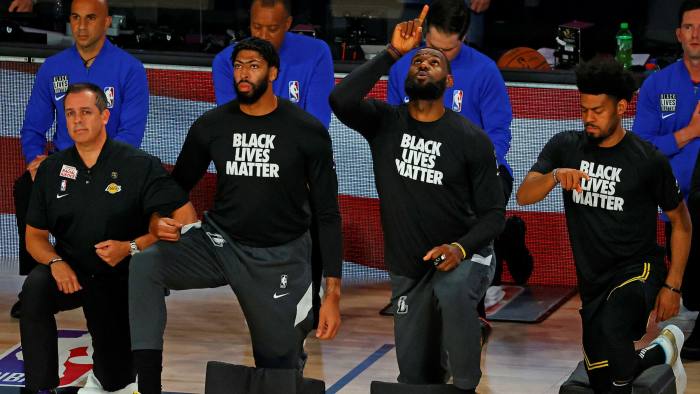
LeBron James, second from right, one of the biggest stars in the NBA, has been a vocal advocate for racial justice © Kevin C. Cox/Pool/AP

Share
When I started getting political, I learned that professional athletes weren’t the people I could depend on for perspective. As I was learning about sweatshops all over the Americas, Michael Jordan was explicit that he would not call attention to abusive working conditions in the global clothing supply chain. He preferred to protect his substantial endorsement earnings.
Kaepernick was a significant shift and a godsend. His image, bravery, and grace spurred attention to police violence and gave us the breathing room to talk about structural racism. Kaepernick’s time at the top of a billion-dollar media product was limited after seemingly blacklisted by the most conservative pro sports owners in North America. They were successful at silencing Kaep. It felt personal because it felt like Kaep was speaking for us, our anguish and pain. I was heartbroken.
Things have finally shifted. Most surprising for me has been the evolution of Lebron James.
We are bearing witness to a form of collective action and escalation previously unseen in pro sports. After the police shooting of Jacob Blake in Kenosha, Wisconsin players restricted their labor in a wildcat strike to express their frustration and exasperation. Early reports indicated that the NBA Players Association was not informed ahead of time. The players, mostly Black, decided on their own to seize the means of television sports production, their bodies, and likeness during the postseason.
The consequences of the pandemic amplify their actions. Professional athletes have an almost monopoly on live content, an unprecedented platform. The excitement of competition has taken hold of starved television viewers. With a strong labor union and a contract that gives them near revenue parity with billionaire owners, Black basketball players have set a persistent presence.
For most of my life, this did not seem at all possible. I am here for it, and my head is still spinning.
Already considered a generational talent destined for greatness, James was a charming and impressive 19-year-old, not a moral compass.
Watching an early Lebron speak politely and scripted was deflating. It was easy to lose track that he was thrust into the spotlight in his late teens under the most intense scrutiny imaginable. James was bright and deferential. Aside from accolades on the court, his only other aspiration was to be the first pro athlete billionaire.
In the wake of the police shooting of Jacob Blake in Kenosha, Wisconsin, on August 23rd, James and many others have embraced the moment. The grown-up James spoke with clarity on structural racism. James erupting into impassioned calls for structural change reflects the shift in public recognition of police brutality against Black bodies.
Toronto Raptors basketball player Fred Van Fleet explained that a stoppage of play would impact owners financially and force them to leverage their political capital to push authorities to prosecute the police who shot Blake.
As we consider the factors shaping and influencing the 2020 presidential election, left unsaid is the singular power that Black professional athletes wield. Sports programming will dominate over the next several months, and the NBA is in the middle of what is already an entertaining postseason in the bubble.
From the minute play started, the showmanship was clear, but underneath it was a shift.
Announcers talked about their challenges with racism. White men spoke of their journey in whiteness. The players spoke their truth instead of the traditionally tedious pre and post-game interviews.
The player’s comments have reflected the brutal reality that their wealth doesn’t protect from bigotry, fear, and racial profiling.
Under the quiet of the pandemic, their collective voices are louder than anyone could have imagined.
NBA players are demanding change from billionaires, and they are the only workers in the world capable of doing so. Their power reflects their proximity to the billionaire class. There is no other scenario on the planet where billionaires board their private jets to recruit superstar Kevin Durant with aspirational multimedia pitches amid city-wide efforts. It’s a players league, and they are flexing.
The analysis of these athletes is undoubtedly shaped by the mass mobilizing led by impassioned Black women and Black queer youth of color. Of anyone else with power and authority in our society, it appears that the players are listening most closely, keep letting them know you are there.
At the apex of their power, professional athletes flexed. Not bargaining for themselves, rather bargaining for the common good. Their platform is secure.
I look forward to what transpires.

